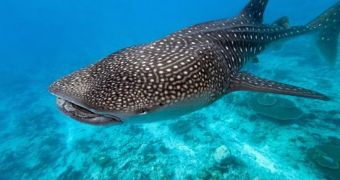WildLifeRisk, i.e. a marine conservation group based in Hong Kong, spent a total of four years keeping tabs on the working agenda of a factory in China's Zhejiang Province, and its findings are nothing short of troubling.
Long story short, this green group says that, after monitoring the Pu Qi factory for said amount of time, it came to realize that this facility was guilty of butchering some 600 whale sharks on a yearly basis.
In a report, the organization goes on to argue that the animals are slaughtered in order to obtain oil that is later used to manufacture cosmetics and health supplements.
By the looks of it, these products are then shipped to and marketed in countries such as the United States, Canada, and Italy, Mongabay details.
What's interesting is that such trading activities are carried out despite the fact that whale sharks are an endangered species, and protected by the Convention on International Trade in Endangered Species of Wild Fauna and Flora.
Hence, WildLifeRisk is asking that authorities intervene and put an end to these trading activities, and that ordinary folks quit encouraging this illegal industry by purchasing products containing whale shark.
“We are calling on China’s regulatory authorities to enforce the international agreements on this illegal activity now, before these animals are brought closer to extinction,” conservationists Alex Hofford and Paul Hilton say.
“If we hope to save species such as the whale shark from extinction, we must hold individuals accountable for their violation of international protection laws and demand transparency so that consumers can make informed decisions about the products they buy,” they add.
Interestingly enough, a recent report pieced together by the Pew Environment Group shows that, currently, the global whale shark tourism is worth some $50 million.
Hence, the activists working with and supporting the WildLifeRisk argue that, be it strictly financially-wise, protecting this species is the right thing to do.

 14 DAY TRIAL //
14 DAY TRIAL //